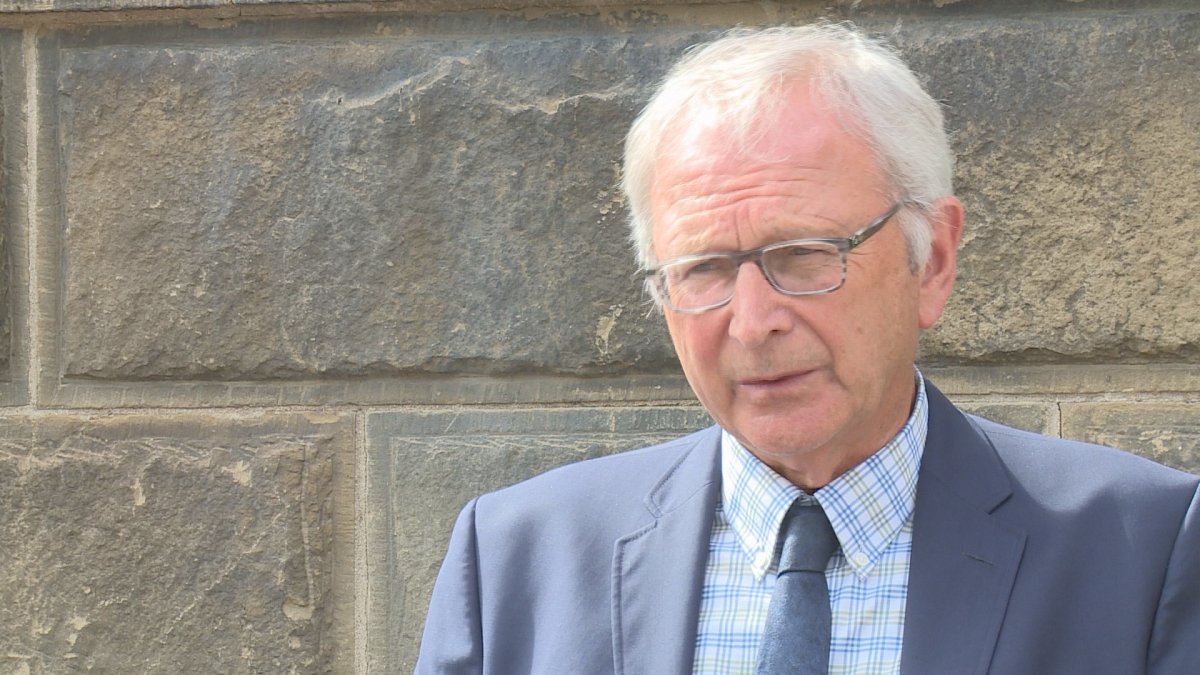The New Brunswick government has responded to a new title claim filed by the Wolastoqey Nations of New Brunswick, calling it unclear.

Premier Blaine Higgs, flanked by Aboriginal Affairs Minister Arlene Dunn and Natural Resources and Energy Minister Mike Holland, spoke about the title claim.
“It is precedent-setting for all of Canada,” he said on Wednesday. “Never before has a claim of this nature attempted to take control of land that is privately owned. It continues to lack clarity that New Brunswickers deserve.
“While this is a matter before the courts, I cannot stand by as premier as most New Brunswickers are unaware.”
This comes after the Wolastoqey Nations of New Brunswick added several new defendants to the claim filed Tuesday.
It names companies that operate on about 20 per cent of the more than 50,000 square kilometres identified in the claim as traditional lands of the Wolastoqey in New Brunswick.
The new defendants include J.D. Irving Ltd. and 18 of its subsidiaries or related entities, NB Power, Acadian Timber, Twin Rivers Paper, H.J. Crabbe & Sons and A.V. Group. The companies are named in addition to the governments of New Brunswick and Canada.
Madawaska Maliseet First Nation Chief Patricia Bernard and Pilick Chief Gabriel Atwin made it clear this is not a title claim to revoke land from the average person, homeowner or business.
- Trudeau tight-lipped on potential U.S. TikTok ban as key bill passes
- Canadian man dies during Texas Ironman event. Her widow wants answers as to why
- Hundreds mourn 16-year-old Halifax homicide victim: ‘The youth are feeling it’
- On the ‘frontline’: Toronto-area residents hiring security firms to fight auto theft
“Let me speak directly to regular New Brunswickers: The Wolastoqey Nation has never had an interest in evicting regular New Brunswickers from their homes or their farms — we know that you or your forebears paid value for your land,” he said in a media release on Tuesday.
Province doubles down on impact to forestry industry
One of the main concerns raised on Wednesday was the impact to the forestry industry.
Minister Mike Holland said the latest claim is concerning.
“The forestry is the backbone to this province’s economy, especially in rural New Brunswick,” he said in a virtual news conference. “The chiefs are proposing they become landlords to private land currently being used by industry. This would have far-reaching and very serious implications.”
Holland said the forestry industry in New Brunswick employs more than 22,000 people and deals with 60 countries. It has about 600 businesses in the industry, with more than 2,500 having ties through the supply chain.
He said what the Wolastoqey Nations are seeking from NB Power is “unclear.”
“It is unclear whether they are seeking the buildings, the land surrounding the buildings or the space where transmission lines cross which can be any home, river or airspace in the province,” he said.
Aboriginal Affairs Minister Arlene Dunn spoke about the ongoing relationship between the government and the 16 First Nation communities within the province, saying with some there is none.
“Our government wants a New Brunswick where all First Nations prosper,” she said in a virtual news conference.
When asked about the strained relationship between the government and the Wolastoqey Nations, though, she said relationships take two sides.
Wolastoqey Nations react
Chief Patricia Bernard addressed the media shortly after the press conference held by the government and said she was not surprised by the comments made.
“It is continuing that fearmongering for the citizens of New Brunswick,” she said. “We have no choice. We are backed into a corner. Nothing is being respected, nothing is being honoured.”
She said it appears the government is confused by the claim. Bernard said this is not a land claim, it is a title claim.
“I don’t understand why he continued talking about that,” she said in a virtual press conference. “What does seem clear is that they need to inform themselves what the difference is between a land claim is because this is not a land claim — this is Aboriginal title declaration.”
Bernard clarified this is not a claim for the traditional territory but for the land owned by these corporations that now make a profit off the resources it extracts.
As for the relationship with the government, Bernard said there isn’t one.
“The Wolastoqey Nation as a whole, there is none and that didn’t seem very appropriate to us,” she said.
Bernard said there is no intention to bankrupt the province, saying doing so would be akin to shooting themselves in the foot.
“We want to work with the province. We want to work with the industries to protect the land moving forward,” she said. ”
In the end, she said the treaties are not being honoured, and there was no choice.
“We are trying to do what’s right,” she said.





Comments